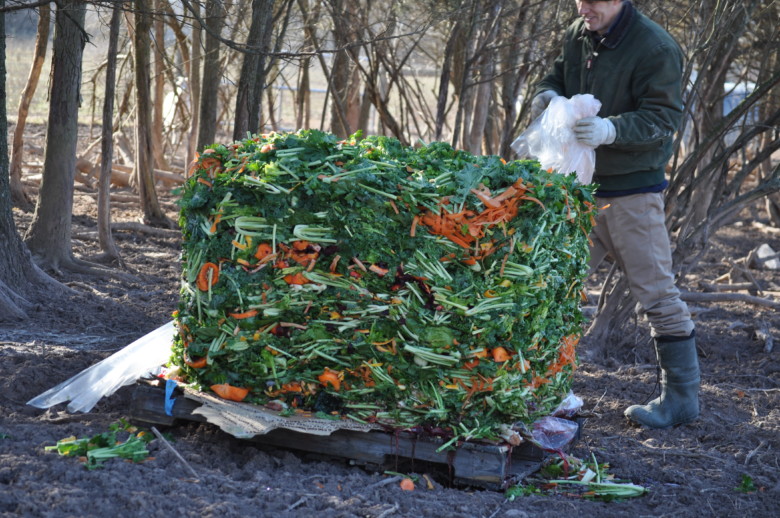
When Thomas McQuillan began telling people Baldor Food would be waste free by 2017, he knew it sounded implausible.
“It sounded crazy, it was so early on into what we were trying to accomplish,” McQuillan, director of food service sales and sustainability at Baldor, said about plans to reinvent the company’s approach to waste when we reported on their efforts in April 2016.
McQuillan is a man of his word. In December 2016, Baldor, one of the largest produce distributors in the Northeast announced it had completely eliminated food waste—which it defines as “any food scraps that are not normally used”—from its Bronx processing facility. That’s 150,000 pounds per week of what McQuillan now refers to as “SparCs:” a term Baldor invented to remove stigma from the term “food scraps” (also “scraps” spelled backward).
The SparCs—think tomato tops, celery butts, carrot shavings and other produce scraps not normally sold—are now being repurposed for both humans and animals.

At Haven’s Kitchen in Chelsea, about 30 pounds a week of carrot trimmings, onion and celery butts and unused tomatoes from Baldor go into soups, pesto and beef stew.
“We just like to play and figure out what we can do and educate our guests,” owner Alison Cayne said. “We always use every part of everything but we didn’t know it was possible to get these parts.”
Cayne met McQuillan through her and Baldor’s work with Edible Schoolyard NYC, but before Cayne could start purchasing those SparCs from Baldor, McQuillan and the Baldor team had to figure out how to repurpose the majority of the 150,000 food scraps, something McQuillan had been thinking about for a while.

“As a food production company we have to look at the waste we generate as part of our production and can it be used,” McQuillan said. “I always saw it as food, and while composting wasn’t a bad solution it wasn’t the optimal solution, edible food should be consumed.”
The answer was animal feed. To eliminate all food waste, Baldor is selling the majority of its food scraps to Wilenta Feed, a company that works with wholesalers to create recycled feed for chickens, pigs and cows. On any given day Wilenta Feed will accept as much of the food scraps as Baldor generates. According to McQuillan, about 85 percent of the SparCs are going to animal feed and about 15 percent to human consumption, but while animal feed allowed Baldor to achieve its zero-waste goal, the company wants to sell less and less of the food scraps as animal feed.

“In 2017 we want to increase the food products going into the bellies of human beings,” McQuillan said. He and Baldor are working to create new food products from the SparCs such as a dried vegetable blend that could flavor dishes including breaded chicken cutlet, roasted vegetables and even used in pizza dough.
To do all that McQuillian continues to work closely with restaurants like Haven’s Kitchen where Cayne is hoping to find a way to use the leaves from Brussels sprouts in new ways. For now, consumers can find and try dishes and drinks made from SparCs at Haven’s Kitchen, Between the Bread, Fresh & Co and Blue Hill at Stone Barns.



